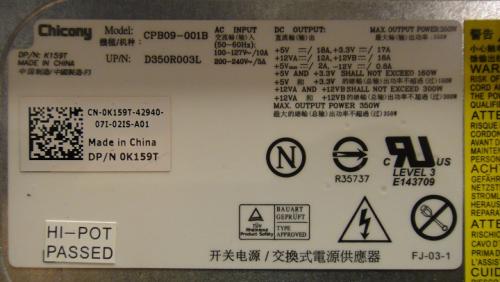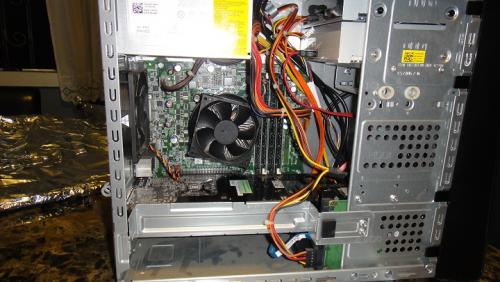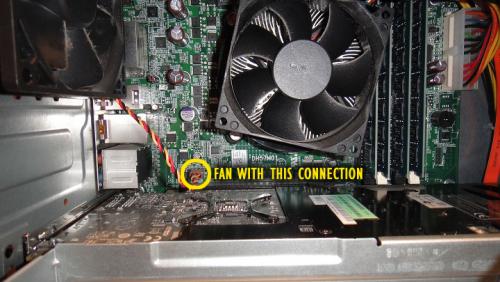Here’s my canned text on sizing and selecting the right PSU:
Use the eXtreme PSU Calculator Lite to determine your minimum and recommended power supply unit (PSU) requirements. Plan ahead and plug in all the hardware you think you might have in 2 or 3 years (extra drives, bigger or 2nd video card, more RAM, etc.). Be sure to read and heed the notes at the bottom of the calculator page. I recommend setting Capacitor Aging to 10% and both TDP and system load to 100%. These steps ensure the supply has adequate head room for stress free (and perhaps quieter) operation, as well as future hardware demands. Research your video card and pay particular attention to the power supply requirements for your card listed on your video card maker's website. If not listed, check a comparable card (same graphics engine and RAM) from a different maker. The key specifications, in order of importance are:
- Current (amperage or amps) on the +12V rail,
- Efficiency,
- Total wattage.
Don’t try to save a few dollars by getting a cheap supply! Digital electronics, including CPUs, RAM, and today's advanced graphics cards, need clean, stable power. A good, well chosen supply will provide years of service and upgrade wiggle room. Look for power supply brands listed under the "Reputable" column of
PC Mech's PSU Reference List. Another excellent read is
Tom’s Hardware, Who’s Who In Power supplies: Brands, Labels, And OEMs. Note that some case retailers “toss in” a generic or inadequate PSU just to make the case sale. Be prepared to “toss out” that supply for a good one with sufficient power.
PSUs are inherently inefficient. Most PSUs have an efficiency rating of around 70%. This means for every 100 watts of power a PSU draws from the wall, only 70 watts is delivered to the motherboard, with the rest wasted in the form of heat. The best supplies are 85 to 90% efficient, and as expected, cost more. A quality supply with an efficiency rating equal to or greater than 80% requires a better design using higher quality (tighter tolerances) components. To ensure a quality, efficient PSU, select one that is
80 PLUS certified and is EnergyStar Compliant. 80 PLUS certified PSUs are required to have fairly linear efficiencies. This is important to ensure the PSU is running at or near peak efficiency regardless the load or power demands. Non-linear PSUs typically are most efficient when the load is in a narrow range between 70 and 90% of the PSU’s capacity and the efficiency may drop dramatically above and below those amounts.
Too big of a PSU hurts nothing but your budget. Your computer will draw from the PSU only what it needs, not what the PSU is capable of delivering. If a computer needs 300 watts it will draw 300 watts regardless if the PSU is a 400W, 650W, or 1000W PSU. In turn, the PSU, regardless its size, will draw from the wall only what it needs to support the computer. In this example, it will draw 300 watts, plus another 45 – 90 watts, depending on the PSU’s inefficiency.
As noted, the eXtreme Calculator determines minimum and recommended requirements. If the calculator (with the changes I suggested) recommends a 400 watt minimum, a quality 400W supply will serve you just fine. However, a quality 550W – 600W supply will have, among other things, larger heat sinks to dissipate potentially more heat. It might have a larger fan too. The 400W supply will run most of the time closer to capacity, while the larger supply will be loafing along, rarely breaking a sweat. To help the smaller heat sinks get rid of the wasted 80 watts (20% of 400) of heat, the fan in the 400W supply may need to run full speed, while the fan in the larger supply, with bigger sinks just loafs along too – but in near silence. Also, it is typical for manufacturers to use higher quality parts, design, and manufacturing techniques in their higher power supplies.
Note: Capacitor Aging. All electronics “age” over time. Electrons flowing through components bang around and create friction and heat causing wear and tear, altering the electrical characteristics of the device. Over time, this weakens the device resulting in eventual failure. Power supplies have always suffered profoundly from aging effects resulting in a loss of capacity. In a large part, this is due to capacitor aging though in recent years, capacitor technologies have improved in that area. The best PSUs use the best (and most expensive) capacitors which suffer less from aging effects than older capacitor types. If planning on buying a new, high-end PSU, setting capacitor aging to 10% may result in a more realistic recommendation. However, headroom “buffer” will be significantly reduced. You can expect your PSU to last 5 years or longer. Since it is better to buy too big rather than too small, and since it is hard to predict what your power requirements will be in 3 years, using 30% for Capacitor Aging ensures you have enough headroom for virtually any upgrade.
Don't forget to budget for a good UPS with AVR (automatic voltage regulation). Surge and spike protectors are inadequate and little more than fancy, expensive extension cords.


















 Sign In
Sign In Create Account
Create Account

